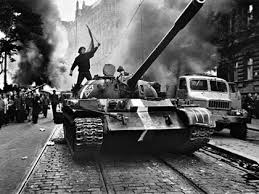 Prague, The 5 January 1968, Alexander Dubček was elected General Secretary of the Communist Party of Czechoslovakia. Czechoslovakia from 1955 He was a signatory of the Warsaw Pact with the Soviet Union and other Soviet bloc countries. Pact that put the allies of the USSR in a State of subordination. DUBČEK was replaced by Antonín Novotný, associated with the Soviet Communist Party, kicking off at “new course”.
Prague, The 5 January 1968, Alexander Dubček was elected General Secretary of the Communist Party of Czechoslovakia. Czechoslovakia from 1955 He was a signatory of the Warsaw Pact with the Soviet Union and other Soviet bloc countries. Pact that put the allies of the USSR in a State of subordination. DUBČEK was replaced by Antonín Novotný, associated with the Soviet Communist Party, kicking off at “new course”.
He began the spring of Prague. The new course that Dubček proposed to establish in Czechoslovakia was the realization of a process of democratization of the country. The realization of the “socialism with a human face”. This necessity reformist left from afar. In previous years had developed a certain discontent arising from an unsuccessful third five-year plan of conduction 1962. This caused a decrease in national income in the next year. To heighten the State of crisis was the knowledge that the guidelines set were dictated mostly by Moscow. This was the assumption that the production process was already a considerable retrenchment in the previous decade always to meet the needs of the country guide, the Ussr. This situation opened a split in the Communist Party of Czechoslovakia. A soul's filosovietica antagonizing fracture determined by and a reformer of Slovak mold. Also the question of Slovakia became ever more urgent since it emerged the lack of harmonisation between the Czech and Slovak team. The latter complained about a penalty at the economic level and an unfair political repression. This scenario favoured the entry of Alexander Dubček, former Secretary of the Communist Party of Slovakia. The reforms were essentially three aspects: introduction of forms of market and private initiative in certain areas; progressive demolition of censorship through an early form of freedom of the press and critics; greater protection of the person by the State Socialist. These actions were initially look at very carefully also by the same labor movement who feared a potential capitalist drift. But the road is the concrete participation of workers in the management of labour and economic planning. In the following months there was the abolition of censorship. It also followed the election in the factories of delegates no longer appointed from above. These acts led to concern in the USSR and other countries that threatened to intervene militarily. The danger of the Soviet invasion was decisive. Workers and students rallied around the reformist Government. Although Czechoslovakia was a reformist initiative led by representatives of politics and not a popular protest as occurred in 1956 in Hungary, He did not wait for the brutal reaction of the Soviet Union and freedom-. This repressive action did not produce the desired effects actually brought out most vulnerable aspects on which the USSR founded his mastery over the satellite States. The insane fear Soviet state of freedom of others.
Hector Parker